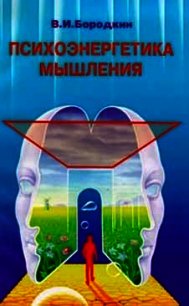Информатика, кибернетика, интеллект - Пушкин В. Г. (книги без регистрации полные версии .TXT) 📗
Informatisation and computerisation of the society life with all its attributes lead to the methaphysical priority of the moral and humanistic imperatives in the creative development of the personality. The authors' conception leads to some methodologic paradigma, which expresses, in essense, the anthropocyberne-tic component of the modern society development. The idea of using the informa-tic-cybernetic technics and the cybernetic knowledge for man's good, for the sensible interaction between the man and the machine, the society and the technics dominates in this book.
The interest to the man's creative abilities increases under scientific-technic progress conditions. The creative work is the creation of something new, progressive and social-valid which has not yet been existed in reality. The automate function is to help the man in his creative work. The transmission of the lower forms of the creative work to the machine allows the man to concentrate on its upper forms which actualize its social essense and ability of self-determination. The cybernetic machines are different from all the previous because they serve as a human intellect amplifiers. The computer's work is creative-like when it leads to the reception of some new results by the man.
Computer's creative work is of the second, derivative level. It is the creative work at the direction determined by the man. It is necessary because the man makes up some progress in his development, giving some kinds of the creative work and problems to the automates. The creation of modern computers rises the creative ability of the man and the society. The fact that the automat repro-ructs man's mental operations and, as far as it can be said, his creative mentality, means, firstly, the man-automate subordination, and secondly, the automat superiority and its significance as special means of help. The social and moral-ethic problems appearing meanwhile need the humanistic orientaton of all the research work in the field of mentality-machine creation.
The investigation of the philosophic aspects of informatics, cybernetics and the artificial development especially needs deep analysis and more precise definition of the intellect conceptions, the conceptions of mind, mentality, in the course of comparison of the peculiarity of the man's mentality with its cybernetic analogous abilities. Such an investigation, as it pointed out by the authors, suggests a creation of methodologic base for mentality essence understanding. On this way a great interest has a generalising analysis and distinguishing of logical, ghnoseological and euristic principles of the mind. To distinguish the structure and to understand the organising principles of the intellect means to reveal the real base of the fundamentally of the problem, to show its deep specificy. In another terms, the question is set up so that it is necessary to learn the historical, scientific-technical and the ghnoseological aspects of the artificial intellect's problem with the direct participation of the scientific philosophy. This program, in essence, has been realised in this edition. The philosophic contents of the artificial intellect has been revealed, as well as its connection with the main question of philosophy; the important meaning of the man-machine relations harmonisation in the informatic aspect has been shown with an entry in the field of the social relations.
The scientific novelty of this book is determined a great deal by the system-cybernetic level of the discussion of the problem chosen, including nonelaborated themes. For example in the chapter "The Artificial Intellect and the Human Society" the following questions are discussed: the system-cybernetic approach in the social cognition; the artificial intellect and the social cybernetics; the moral-ethic aspects of the artificial intellect problem. The work contains critics on the behaviorism methodology in the frame of which the ghnoseologic problems of consciousness have been denied in general. While investigating the authors of the book show how the development of an intellect-modelling computerised principles can help us to answer the philosophic-rate questions arising in the scientific-technical revolution.
Thus, the philosophic content of the cybernetisation and informatisation of the human activity, these deep processes embracing, in essence, all spheras of life of the modern human being, has been revealed in this book. The authors of the book have accentuated their attention on the forming of modern philosophic ideas in the field of informatics and cybernetics arid on general-systamic and general scientific tendencies. It has been shown how the cybernetics through the prism of the philosophic self-consciousness had initiated some new approaches, which are of such a great need in the practical actualisation of the scientific-technical progress. The talk is about the quality analysis to be enreached by the quantity investigation, the creation of the quality-quantity basis of the society's scientific management.
The monograph is characterised by the special common-scientific and dialectic synthesis of the fundamental problems of the informatics, the cybernetics, and the intellect, which allow the approach toward the key-questions of the world conception and the methodology of the practical problems of the scientific-technical progress acceleration carrying out.



